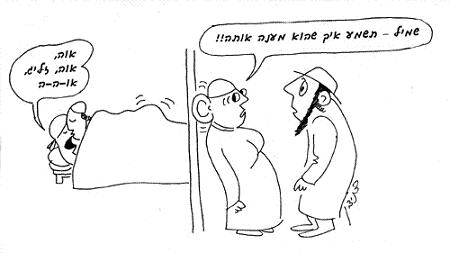
The sages ruled that on the Day of Atonement one is forbidden to eat, drink, wash, anoint, wear leather shoes, or have sexual relations (Yoma 73b). These prohibitions, though they are not explicit in the Scriptures, were derived by the sages from the general commandment in the Torah: afflict your souls (Leviticus 16:31). The scholars attempted to figure out from whence the sages knew that the prohibitions listed above are categorized as afflictions. Thus, for example, they find the Scriptural source for a cessation of sexual relations as affliction. Answer: When Jacob ran away from Laban with Rachel and Leah, Laban’s daughters, Laban warned Jacob: “If you afflict my daughters, or if you take other wives besides my daughters” (Genesis 31:50). What did Laban mean in telling Jacob “If you afflict my daughters“? If you stop having sexual relations with them! The scholars asked: Perhaps Laban’s intention in saying If you afflict was that Jacob should not take additional wives besides Rachel and Leah (it is an affliction for a woman if her husband marries an additional wife), as is explicit later in the verse: “or if you take other wives besides my daughters.” The scholars rejected this interpretation, arguing that it is written “or if you take,” implying that this is an additional request by Laban, not an explanation of his first request. The scholars continued to argue: One could interpret Laban’s two requests of Jacob not to marry additional women as If you afflict my daughters — do not treat the maids Zilpah and Bilhah as being of equal status to Rachel and Leah (which would afflict them) and do not take other wives besides my daughters — besides Rachel and Leah. This argument, too, was rejected by the scholars: it is human nature, they argued, to discuss the more serious matter first and only them the less serious. Laban should have first warned Jacob against marrying other women (a serious affliction) and then warn him against a less serious affliction (giving status equal to that of Rachel and Leah to the maids). Another sage, Rav Papa, argued that it is sexual relations which are the affliction, so the command “afflict your souls” might mean that one is permitted to have sexual relations on the Day of Atonement. Where did this sage find sexual relations called affliction in the Scriptures? In the verse describing the actions of Shechem son of Hamor towards Dina, the daughter of Jacob. “And when Shechem the son of Hamor the Hivite, prince of the country, saw her, he took her and lay with her, and afflicted her” (Genesis 34:2). This implies that it was the sexual intercourse which was Dina’s affliction.
A different sage, Abaye, answered that the affliction with which Hamor afflicted Dina was not sexual relations, which she enjoyed, but that Dina desired Shechem the son of Hamor and he would not give in to her desire for him, and thus afflicted her.
(Babylonian Talmud, Tractate Yoma 77a-b)
